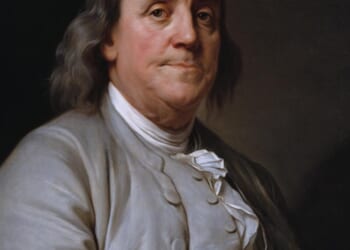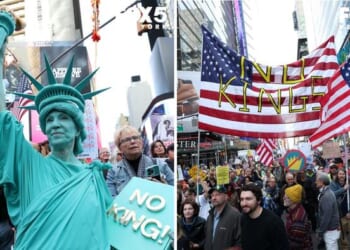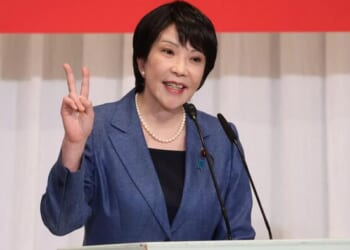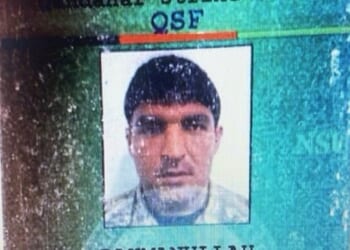Christianity is expanding on the African continent and wields great influence, but persecution and religious oppression remain critical issues. Senator Ted Cruz’s recent legislation shines a light on the plight of persecuted Christians, including terrorism, discrimination, displacement, and legal pressure. President Trump’s response to persecution in Nigeria should incentivize greater effort to bring peace to imperiled Christian communities across the continent.
The state of Christianity in Africa is complex: a success story of resilience and growth across more than 50 unique states, yet through pressure and persecution it presents an urgent human rights crisis in many areas on the continent. As the world increasingly recognizes ever more countries in Africa as rising geopolitical and economic partners, the rapid growth and significance of Christianity in Africa—and the church’s struggles against discrimination and terrorism—is becoming more apparent. Working with African governments, the United States is unique in its ability to foster awareness and protection for Africa’s imperiled Christian communities, and meaningful action today would only further reinforce this White House’s legacy as generational peacemaker.
Recent attacks on Christians in the Democratic Republic of the Congo (DRC) and Mozambique and the long-standing concern for religious persecution in Nigeria have found the two-millennia-old plight of targeted and threatened Christian populations permeating Washington’s collective attention. As in every generation, governments American and African alike now face an inflection point to step into a Golden RuleREF moment.
The Church’s Expansion in Africa
Christianity was introduced to Africa during the first century, but its expansion accelerated greatly during the 1900s and, in post-colonial Africa, the religion’s rise coincides with the continent’s rapid population growth. Christianity continues to expand across Africa, representing more than a quarter of the world’s Christian population,REF and Africa today is home to approximately 750 million Christians. Protestant, Catholic, Orthodox, and unaffiliated Christian communities thrive particularly in southern, central, and eastern Africa, with others persevering as a minority religion in northern and some western African countries.
As Africa is best understood in a regional and country-specific context, so, too, are its Christian communities. Many African nations are predominantly Christian and reflect Christian values and beliefs. Countries with the largest Christian populations include Ethiopia, with an estimated 77.5 million Christians and hosting one of the world’s oldest congregations in the Ethiopian Orthodox Tewahedo Church (EOTC), as well as the DRC with 63.1 million, South Africa with 52.9 million, and Kenya with 40.7 million.REF Tanzania, Mozambique, Ghana, and Uganda are among the fastest-growing Christian populations,REF and several African states find Christians representing more than 90 percent of the population, including Zambia, Rwanda, the DRC, Angola, Namibia, and Lesotho.
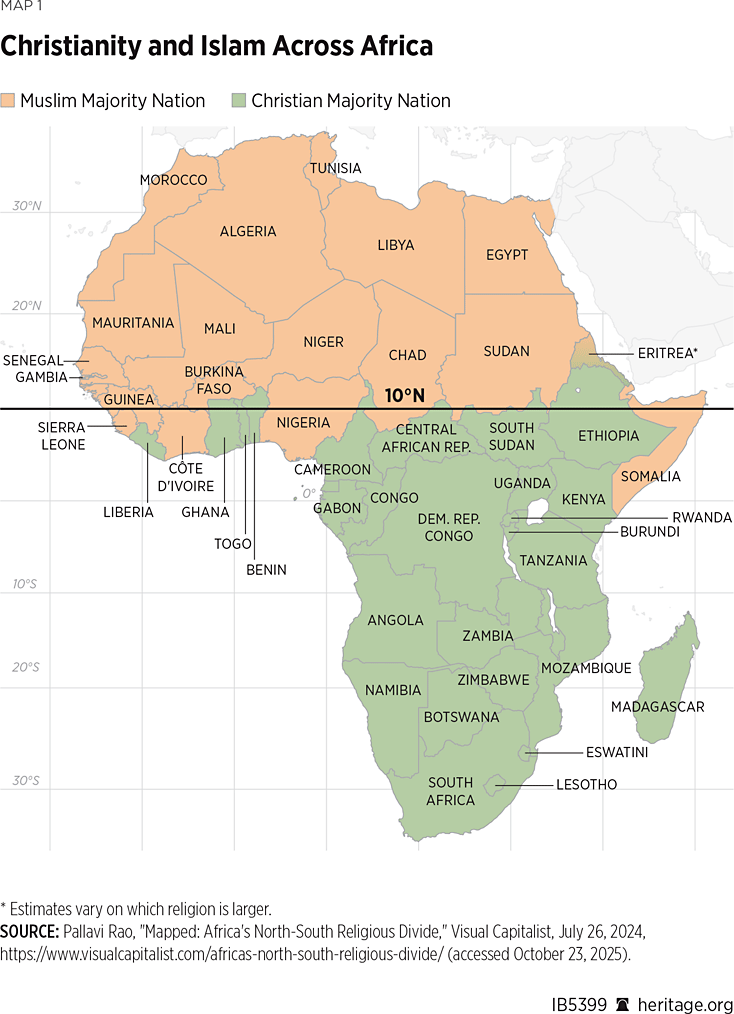
Beyond population, Christianity’s influence on culture and governance is ubiquitous. Zambia’s constitution, for example, establishes the country as a Christian nation, while still affording freedom to all religious groups. In Ethiopia, the EOTC, historically, and the Prosperity Party, currently, wield significant political influence, and in West Africa, Pentecostal and charismatic churches are increasingly popular and powerful cultural motivators. Since the mid-20th century, Christian leaders have often been visible in the call for democratization, good governance, and social mobility, and have advocated civic engagement and human rights reforms. Christian missions reinforce ministry activities and partner with African congregations on education and health care initiatives and facilitate humanitarian aid in response to crises and development challenges. In West Africa, countries are diverse in their religious compositions, making for successful interreligious working relationships in some instances and persistent conflict in others. Nigeria’s 74.4 million Christians represent nearly half the country’s population,REF the second-largest Christian population on the continent, and Christianity continues to gain popularity along the Guinea Coast.
In Muslim countries in North Africa and the Sahel region, Christians are a small minority, and these governments offer varying degrees of protection for Christian practices. Many North African and Sahel states have established Islam as the official religion, though most, like Morocco, Algeria, and Tunisia, afford rights for freedom of conscience and worship. Mali’s new constitution shifts the country to a secular state, guarantees the freedom to practice any religion, and prohibits religious discrimination; however, this unexpected step may be undone by terrorist organizations threatening the young government. Egypt is home to the Coptic Orthodox Church and approximately 11 million Christians, representing an estimated 10 percent of the population; elsewhere in the region, however, people identifying as Christian represent fewer than 3 percent of the population—and in several instances, less than 1 percent.REF
Challenges, Conflicts, and Persecution
Despite its growth, the Christian church in Africa continues to confront significant challenges. With competition from other religions and secular pressure, Christianity encounters several of the same obstacles the faith experiences elsewhere around the world. These challenges are not limited to policy or legal restrictions or a competition of beliefs but extend into extreme and brutal violence and result in destroyed churches, displaced Christian populations, and an incalculable number of killings in recent years.
Persecution remains an everyday, terrible reality for many African Christian communities. In the northern areas of Nigeria, the DRC’s North Kivu and Ituri Provinces, northern Mozambique, and the Sahel, terrorist and extremist organizations deliberately target Christians for killings, beheadings, kidnappings, and church burnings in an effort to disrupt and destroy Christian communities and their influence. Reliable estimates of Christians killed, assaulted, and displaced and churches destroyed are difficult to confirm due to underreporting in remote regions, but some estimate Christian victims of faith-based violence as more than 150,000 during the past decade,REF with organizations that track Christian persecution suggesting that these numbers can be higher still.
Disturbing examples of recent violence include Allied Democratic Forces (ADF) militants beheading 70 Christians in Kasanga in the DRC’s North Kivu Province in February 2025,REF and the massacring of more than 40 women and children in Komanda in the DRC’s Ituri Province in July 2025REF; and the Islamic State Mozambique Province (IS-Mozambique) killing of 29 Christians and destroying more than 1,000 homes, 23 churches, and 12 schools during a six-month period in 2024 in northern Cabo Delgado in Mozambique.REF
IS-Mozambique and the ADF join terrorist organizations, such as Boko Haram—officially known as Jama’at Ahl al-Sunna li al-Da’wa wa al-Jihad (JAS)—and the Islamic State West Africa Province (ISWAP) in Nigeria and other parts of West Africa, al-Shabaab in Somalia, and Islamic State Sahel Province (ISSP) and other al-Queda affiliated groups in the Sahel as direct threats to Christian communities. Broader dangers, such as disease, migration, famine, and war, compound problems faced by targeted and vulnerable populations. Cultural and ethnic divisions, as well, fuel violence against Christians in land disputes and add greater complexity to interreligious conflicts.
Many African governments do not distinguish faith-based violence from general violence, missing the opportunity to capture data on the severity of religious-specific persecution. Public officials’ endorsement of persecution—proven or perceived—mars government credibility and raises skepticism from a global community still working to fully understand the issue. Though not deliberate, persecution, too, can be further exacerbated by nascent or poorly resourced government structures, accentuating the need for accountable and transparent public administrations.
African governments’ response to these issues varies in efficacy and resourcing. As a key principle, the African Union reinforces religious freedom through the African Charter on Human and Peoples’ Rights, guaranteeing freedom of conscience, religion, and belief.REF Many African states have led successful efforts for religious freedom awareness and partner with peer states and nongovernmental organizations (NGOs) to expand dialogue on faith issues. Several North African governments have revised laws on religious freedom and protection from discrimination, as well, though these could be undermined through existing anti-blasphemy and anti-proselytism or conversion laws, which are intended to safeguard religious dignity but apply to Islam only. Concerns that these laws can be exploited and justified for containment, discrimination, imprisonment, and acts of violence suggest that greater legal nuance is required to fairly accommodate free religious practice.
In areas suffering from terrorist attacks, cooperation on counterterrorism includes examples like DRC forces working with United Nations peacekeeping operations for joint missions against the ADF, and the Somali government combatting threats from al-Shabaab with the assistance of the United States, but both situations remain unpredictable. New Sahel administrations are under intense pressure to contain the extremist forces that, in part, unraveled their predecessors, including Mali, Niger, and Burkina Faso, creating the Alliance of Sahel States (AES) defense pact in 2023 to fight terror syndicates.
Nigeria’s Struggle Against Persecution Under Focus
Today, the Christian persecution crisis may be nowhere more severe than in Nigeria. Christians represent nearly half of the West African nation’s population, and the Christian faith levies a profound influence on politics and society, but still the church is under tremendous duress.
Like persecution elsewhere in Africa, Nigeria’s situation is complex. Largely, violence against Christians, Christan sympathizers, and moderate Muslims is driven by Boko Haram and ISWAP, attacking Christian communities in an ongoing effort to eradicate Christianity from the region. Violence is focused in states representing Nigeria’s “Middle Belt”—among the most hostile regions for Christians anywhere due to terrorist control, concentration of attacks, remote access and underdeveloped infrastructure, and historic ethnic conflicts. This human rights crisis is marked by the killing of an estimated 45,000 to 52,000 Christians from 2009 to 2023,REF as well as 34,000 Muslims and others during this time frame, figures still seen as underreported by human rights groups.
The Nigerian government continues to denounce terrorist groups, and conducts operations against these organizations with mixed results. While many public leaders have been visible in their fight against terrorism and extremism and the protection of the church, the government has simultaneously fielded criticism for an underwhelming response to Christian persecution—making for an uneven message to the world about the seriousness of the crisis. Blasphemy laws are maintained on a provincial level to provide legal grounds for assaulting Christians, and further complicating the matter, an ethnic clash between Fulani herders and Christian farmers have brought additional attacks on Christians motivated by a continuing land conflict, resulting in more killings, home and church burnings, and other brutality.
Violence continues at an alarming rate. During the first seven months of this year, more than 7,000 Christians have been reportedly killed by terrorist and extremist groups,REF demonstrating that this crisis in only worsening.
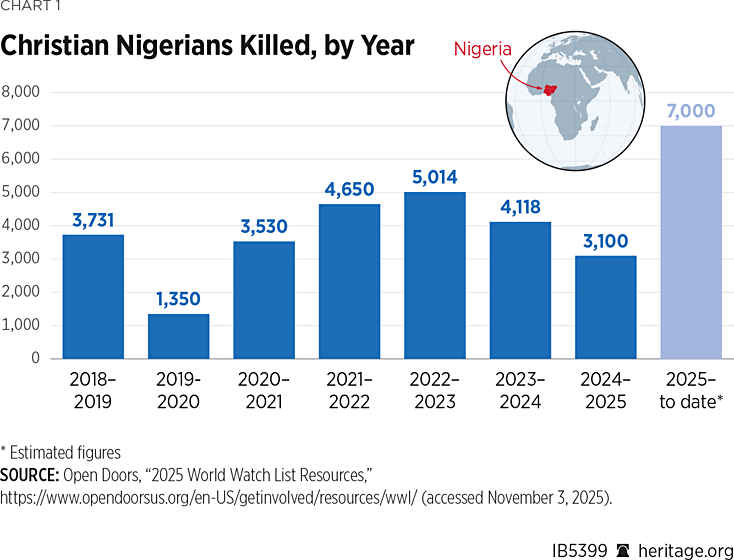
Multiple nongovernmental and human rights organizations have expressed concern over the situation in Nigeria, with religious persecution watch groups stressing the urgency for greater action by Nigerian officials and greater protection for vulnerable, threatened Christian Nigerians.
Amplifying exposure of Nigeria’s struggle against persecution, the European Parliament continues to condemn and question violence in the country.REF In the United States, Senator Ted Cruz (R–TX) recently introduced legislationREF to elevate the discussion in Washington, Abuja, and around the world. The legislation calls for relisting Nigeria as a Country of Particular Concern (CPC) and reaffirming Boko Haram and ISWAP as Entities of Particular Concern (EPC), increasing pressure for clear, meaningful action.
On October 31, 2025, President Donald Trump announced his intent to relist Nigeria as a CPC.REF He furthermore signaled that, without action by the Nigerian government, the United States would terminate aid to the West African country and prepare a military response to protect persecuted Christians.REF
The American Role
These recent developments bring Africa closer to the periphery of an American news cycle that rarely discusses African affairs or persecuted Christians, making this a moment to leverage for greater awareness and, ultimately, real action. Human rights attacks against Christians occur too often, though escape mainstream America given unfamiliarity, distance, and competing priorities. If not for the efforts of a dedicated NGO community, much of the persecution on the African continent may be unreported in the U.S., as nonprofit organizations serve as essential conduits for communication, information, and aid resources.
Historically, the United States government’s response to the persecution of Christians in Africa has, as on the behalf of any persecuted religious minority, featured diplomatic initiatives, bilateral and multilateral advocacy, and humanitarian aid, though results differ by peer African administrations’ commitment to engage. On the continent, U.S. military capabilities protect American interests, conduct counterterrorism operations, and support global peacekeeping and stability efforts. Organized under the U.S. Africa Command (AFRICOM) and headquartered in Stuttgart, Germany, U.S. security activities include cooperative trainings and exercises, task force organization, and assistance with defense strikes against militants and other extremist groups. Like diplomacy efforts, U.S. security efforts require cooperative and aligned partners for enduring, effective counterterrorism operations.
For the global Christian community, President Trump asserted religious freedom as a cornerstone of U.S. foreign policy during his first term, including through the 2020 executive order on “Advancing International Religious Freedom,”REF which strengthened the U.S. government’s commitment to religious liberty and ensured religious freedom as a foreign policy priority. Early in his second term, President Trump maintains his emphasis on preserving religious freedom, including restoring the White House Faith OfficeREF and launching the Religious Liberty Commission.REF Though these initial efforts focus on domestic religious freedom, the same lens should apply to foreign policy. There are key personnel appointments—such as the Under Secretary of State for Foreign Assistance, Humanitarian Affairs and Religious Freedom, and the Assistant Secretary of State for African Affairs—to be announced that, when confirmed, will further enable strategic planning and lead bilateral dialogues to negotiate tangible protections for persecuted Christian communities. The President’s immediate response to worsening persecution in Nigeria demonstrates his seriousness, and as the White House remains unflinching in its pursuit of peace, expectations are high as this Administration maintains its generational leadership example.
Significantly, American NGOs, churches, faith organizations, and government leadership enjoy strong relationships based on shared faith and interfaith priorities and recognize the prominence of Christianity in much of the African continent. Common ground goals for safety, charity, and prosperity enable bilateral and multilateral dialogue to the benefit of all stakeholders and point to opportunities for further alignment and collaboration.
Ending Persecution: Recommendations for U.S. and African Leaders
Despite its strength across much of the continent, the continued persecution of Christians merits priority attention. It is incumbent upon African governments to ensure that policies, appropriations, and actions protect vulnerable and targeted communities. In addition to reinforcing security and stability operations, the following may be considered by Africa’s leaders to mitigate the danger to threatened Christian communities:
- Communicate Africa leadership statements. Clear leadership positions in support of persecuted Christians are important to setting an example for constituencies at home and clarifying narratives abroad.
- Enhance religious-freedom enforcement. Codified in many African country constitutions, ensuring consistent enforcement of religious freedom protections would lessen aggression against threatened Christians and other religious minorities.
- Revisit religion-protection policies. Intended to preserve religious dignity, anti-blasphemy and anti-conversion laws can also be exploited by malign and extremist groups to justify discrimination, criminalization, and violence against Christians; as a public good, such laws warrant re-evaluation.
- Focus on faith-based violence. African governments should consider specifically calling out violence against Christians and others targeted for their religious beliefs to signal recognition of the heightened degree of malice in persecution for faith. The U.S. State Department’s Office of International Religious Freedom could serve as a resource for interested governments exploring any such focus.
- Improve data reporting. Presently, data collection is inconsistent due to various challenges in accessibility and communication. Accurate data collection provides a more complete understanding of the extent of each crisis, the victims, and the responsible parties, and can identify trends and inform responses and resource allocation.
The United States is unique in its ability to influence and assist meaningful engagement in Africa. As seen in the response to religious persecution in Nigeria, this White House is unabashed in mitigating violence against Christians. AFRICOM maintains security operations across the continent and the U.S. government’s toolkit includes sanctions and designations for countries and entities of particular concern to be deployed to swiftly penalize specific actors. To reinforce its efforts to protect persecuted Christians throughout Africa, the Administration should also consider the following:
- Restart the framework for international religious freedom. During his first term, President Trump’s Department of State became a generational example in its call for the protection of and rights for the Christian church abroad, underpinned by the executive order on “Advancing International Religious Freedom” to set religious freedom as a foreign policy priority. Restarting this framework would resume America’s leadership for peace for persecuted Christians in Africa and worldwide.
- Identify key personnel for Africa. Among other appointments, the Administration will set its tone for the U.S.–Africa relationship through its nomination of an Assistant Secretary for African Affairs. This senior leader will work with pastor and former Representative Mark Walker (R–NC), the nominee for Ambassador-at-Large for International Religious Freedom, to identify the diplomatic approach to protecting vulnerable Christians on the continent.
- Facilitate peace through trade negotiations. The White House has proven its ability to leverage deal-making strengths to resolve conflicts around the world and unflinchingly take clear stances. Present negotiations in special circumstances could set expectations to demonstrably increase support, enable greater counterterrorism cooperation, and pursue and enforce laws crucial to the protection of threatened religious communities.
- Increase counterterrorism cooperation. Effective counterterrorism measures are critical to establishing stability for persecuted Christians. AFRICOM can be an asset to mitigating terrorist threats with bilateral and regional government cooperation. U.S. Special Operations Command Africa’s (SOCAFRICA’s) efforts could be expanded to provide operational capacity, training, and other strategic enhancements according to specific crisis needs, replicating successful counterterrorism initiatives, such as Flintlock, to tailor the response to regional extremist groups.
- Establish a congressional delegation and senior official visit to Nigeria. The terrorizing of Christians in Nigeria is one of the most alarming examples of persecution today. Building on President Trump’s bold stroke and Senator Cruz’s legislative efforts, Members of Congress and Administration officials can show an unmistakable and powerful level of concern by taking this conversation to Abuja on an official visit and spark the critical, working dialogue to the better understanding of—and guaranteeing meaningful and sustainable action in response to—this human rights crisis.
Conclusion
Christianity in Africa is an indelible part of the continent’s character. Christianity’s significance to society and governance is unmissable, and Africa’s ascending geopolitical and economic importance finds a new generation of Christian leaders serving as difference-makers for regional and world issues.
It cannot be ignored that this ascent remains embattled. Whether in Nigeria or elsewhere, violence against Christians requires action. In the African countries dedicated to eliminating persecution, leaders should look to enhanced counterterrorism measures and stouter enforcement of existing religious freedom and protection laws and serve as a steadfast example for religious liberty. Leaders might also work toward alignment with a White House firmly committed to peace, a commitment the Christian community is excited to see extended to those imperiled in Africa and around the world.
Ned Rauch-Mannino is a Visiting Fellow in the Douglas and Sarah Allison Center for National Security at The Heritage Foundation.




